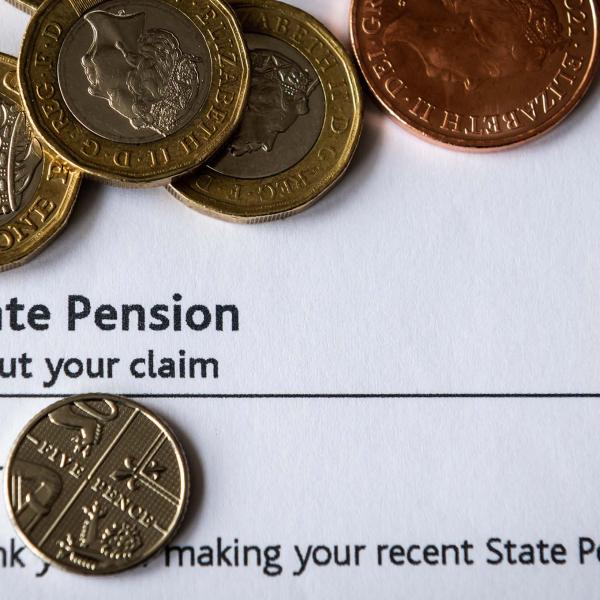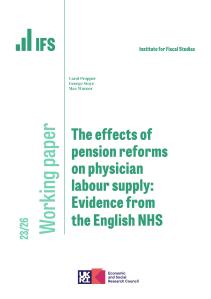Between late 2018 and late 2020, the state pension age for men and women rose from 65 to 66, meaning that the approximately 700,000 65-year-olds in the UK had to wait another year before they could receive a state pension. The key impact of this was that 65-year-olds missed out on state pension income of £142 per week on average.
These reductions in state pension income meant that the absolute income poverty rate for 65-year-olds rose by 14 percentage points, or nearly 100,000 people, to reach 24% by late 2020. The higher state pension age also encouraged around 9% or 60,000 more 65-year-olds to stay in their job and retire later.
These are some of the key findings of new research published today by researchers at the Institute for Fiscal Studies, which has been funded by the Centre for Ageing Better. The research analyses how household incomes and income poverty rates have been affected by the increase in the state pension age from 65 to 66. This is particularly important as there is an ongoing independent review of the state pension age for the Department for Work and Pensions, led by Baroness Neville-Rolfe.
Other key findings from the new research include:
- The groups most adversely affected by the increase in state pension age were those less likely to be in work at age 65 anyway and who have less private income to rely on. That means that the less well educated, those in rented accommodation and single people were hardest hit. Most of the increase in income poverty for 65-year-olds due to the reform has been among people not in paid work.
As a result of increasing the state pension age from 65 to 66,
- the income poverty rate of single people aged 65 rose by 22 percentage points, from 16% to 38%;
- the income poverty rate of 65-year-olds with at most GCSE-level education rose by 21 percentage points, from 14% to 35%;
- the income poverty rate of 65-year-old renters rose by 24 percentage points, from 22% to 46%.
- The rise in the state pension age from 65 to 66 led to larger increases in income poverty rates among those affected than the increases in poverty rates seen following earlier rises in the female state pension age. This is due to a growing gap in state support over time for those just above and just below the state pension age, together with the fact that people are more reliant on state support at older ages as fewer people are in paid work.
- With lower state benefits and higher tax revenues from employment, the increase in state pension agefrom 65 to 66boosted the public finances by £4.9 billion per year, equivalent to around a quarter of 1% of national income, or 5% of annual government spending on state pensions. The benefit to the exchequer is the key counterpart to the reductions in household incomes caused by the reform.
Laurence O’Brien, a Research Economist at IFS and an author of the report, said:
‘Increasing the state pension age is a coherent government response to increases in life expectancy at older ages and the resulting pressures on the public finances. But it does weaken household budgets. We find that 14% of 65-year-olds were in income poverty in late 2020 as a direct result of the state pension age rising from 65 to 66, with this concentrated amongst renters, single people and those with lower levels of education.’
Jonathan Cribb, an Associate Director at IFS and the other author of the report, said:
‘The rise in the state pension age to 66 led to a bigger increase in income poverty rates than was caused by previous increases in the female state pension age. This is due to the growing gap in the generosity of financial state support between those above and below the state pension age, as well as the fact that people in their mid-60s are less likely to be in employment and therefore more dependent on the state pension for income than those in their early 60s. A key takeaway for policymakers is to ensure the working-age benefit system appropriately supports those approaching the state pension age, with this being increasingly important as the state pension age increases further.’
Emily Andrews, Deputy Director for Work at the Centre for Ageing Better, said:
‘These statistics are shocking and show that the number of 65-year-olds in absolute poverty rose from one in ten before the state pension age increase to almost one in four just two years later. The severity of this situation means it is crucial the government gets serious on improving access to work for people in their 60s: investing in tailored employment support for those out of work, expanding access to occupational health support, and bringing flexible work and carer’s leave proposals into legislation.
But even if the government can deliver all this, for those who are unable to access work, the raising of the state pension age will leave them poorer – and in many cases, actually impoverished.
What this research tells us is that further increases in the state pension age must be accompanied with a holistic review of how our social security system supports us as we age, and how to mitigate the hardship awaiting those whose ability to work is compromised in the years before they reach pension eligibility.’










